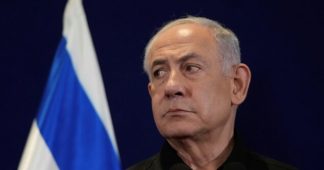By
12 June 2015
In this recent interview on Ynet News, Jewish Israeli activist Ronnie Barkan was interrogated by anchor Attila Somfalvi.
Barkan is a member of Boycott From Within, a small group of Israeli Jewish dissidents and Palestinian citizens of Israel who support the boycott, divestment and sanctions (BDS) movement. Somfalvi demanded to know the source of BDS funding.
Although repeatedly cut off and talked over, Barkan holds his own and insists that Boycott From Within has little in the way of serious funding. “I have never received any outside support for my activism,” he said. Boycott From Within activism “is done out of a sense of moral obligation.”
From the introduction of the segment where the anchor says of boycott supporters that “some of them live abroad and are funded by foreign organizations,” to the introduction of Barkan (which included “Hello Ronnie in Italy”), the insinuations are evident. Of course the vast majority of Boycott From Within supporters live in Israel, and Barkan himself only recently moved to Italy.
It seems unusually important in Israel to point to perceived foreign funding while demonizing the organizations who support even minimal Palestinian rights. Attacks have ranged from those against the New Israel Fund to attacks against the anti-Zionist Boycott From Within, as seen in the embedded clip. Despite being a Zionist organization, the New Israel fund is attacked for supporting a number of liberal and progressive initiatives, particularly those of Palestinian citizens of Israel.
The hypocrisy is astounding. Not only is the US government arming and funding Israel’s military occupation of the West Bank, East Jerusalem and Gaza to the teeth, but Israeli settler-colonies in the occupied territories and some of the country’s most right-wing politicians are also heavily funded by foreign donors — primarily from the US.
Right-wing donors
In January of this year, Sheera Frankel of Buzzfeed reported that in his last three elections, more than 90 percent of Israeli Prime Minister Benjamin Netanyahu’s campaign funding came from US donors. One Likud party volunteer even rhetorically asked Frankel, “Why get money from Israel when you can get it from the US?”
Just behind Netanyahu’s fundraising from US donors in this year’s Israeli elections was science minister Danny Danon, who opposed Ariel Sharon’s removal of settlers from the Gaza Strip, claimed African migrants had established “an enemy state, a state of infiltrators” in Tel Aviv, and once told Al Jazeera English “There is place only [sic] for one state on the land of Israel … I do not believe in a two-state solution.”
The Israeli politician who raised the most from US donors in this year’s election was Naftali Bennett. Bennett was a minister in a number of Netanyahu governments and his Habayit Hayehudi (Jewish Home) party is considered to the right of Likud.
A Time magazine graph showing US donor funding of the Israeli right in this year’s election shows that large sums also reached several other politicians. Defense Minister Moshe Yaalon, Moshe Feiglin (who was banned from the UK in 2008 and who advocates for a purely theocratic state in Israel) and Ayelet Shaked (who has advocated the genocide of Palestinians) were all heavily funded by donations from the US.
US donors even heavily funded a 2012 struggle for leadership of the center-right Kadima party between Tzipi Livni and former chief of staff Shaul Mofaz (which Mofaz won).
Funding Israel’s occupation
A 2010 New York Times article describes more than 40 US groups who raised more than $200 million in tax-exempted contributions for Israeli settlements between 2000 and 2010.
These organizations maintain a tax-exempt status in the US despite the long-standing official position of the White House and State Department against Israeli settlement construction. Many of the settler organizations raising money in the US are involved in the violent takeover of Palestinian homes in occupied East Jerusalem and the rest of the West Bank, such as the US arm of Elad, the Friends of Ir David, which sponsors the colonization of the village of Silwan.
The former Executive Director of another settler organization I wrote about in 2009, The Hebron Fund, made racist statements including: “democracy is poison to Arabs,” “Israel must not give Arabs a say in how the country is run” and “you’ll never get the truth out of an Arab.”
The fund’s spokesperson in Hebron, Noam Arnon, memorialized another settler who massacred 29 Palestinians while they were praying at the Ibrahimi Mosque as “an extraordinary” and “a lovely person.”
A short documentary, filmed by Palestinians living in the vicinity of the Tel Rumeida settlement in Hebron, depicts a family forced to live within a cage in order to protect their home and their children from the very same Israeli settlers supported by The Hebron Fund.
In one night in 2014 the Friends of the IDF, a nonprofit that raises money for the Israeli military, collected more than $20 million in New York City. The same year, just months after the Israeli military had killed more than 2,200 Palestinians in Gaza (the vast majority civilians and 521 of them children), a Los Angeles gala for the Friends of the IDF raised an additional $33 million.
That’s more than $53 million dollars raised at just two events in the United States last year, and all of it provides donors tax breaks for sponsoring another country’s military. Even the childish and fascistic upstart Zionist organization Im Tirtzu received most of their funding from US donors.
By contrast, Israeli activist and member of Boycott from Within Kobi Snitz pointed out to me that “not a single Israeli left NGO [nongovernmental organization] can receive tax deductible donations [within the country].”
Foreign funding rhetoric
I asked a number of Jewish Israelis why Israeli society seems to couple any source of dissent with foreign funding.
Snitz, who featured prominently in the award-winning documentary Budrus, told me, ”the idea that dissent in Israel is driven by foreign money is as fantastic as it is pervasive. From army privates who claim to know for a fact that demonstrators are paid to attend demonstrations, to the intellectual who rationalizes the need to clamp down on left NGOs. That clamp down is not just a threat but a long established fact.”
Boycott From Within member Elisha Baskin explained it to me more broadly, saying, ”Israelis are obsessed with the notion that the world is against them, that the world has double standards, and that Israel is under higher international scrutiny than any other country. Israelis think that the UN is only concerned with the human rights of Palestinians and therefore extrapolate that human rights are bad for Israel. Israelis conflate international NGOs, and non profits with the UN and organizations that use human rights lingo (there is even a common expression in Hebrew – Um Shmoum – meaning the UN is bullshit, in short).”
Two common themes in the responses I received were that Israeli society, often overrun with xenophobia, believes the entire world is against them, and also that it is easier to attack dissenters than to deal with what they’re saying.
Addressing the former theme, Israeli journalist Noam Sheizaf wrote to me: ”Needless to say, this has nothing to do with reality. Not just because of the foreign funding to those very same rightwing groups who ‘monitor’ (or go after) human rights NGOs, but also because with all the pressure now, Israel still enjoys favorable relations and diplomatic support from most of the Western countries, and all concrete steps against the occupation have been very minor, to nonexisting at all.”
Editor’s note: this article initially misidentified Shaul Mofaz as former Mossad chief. This has been corrected.
We remind our readers that publication of articles on our site does not mean that we agree with what is written. Our policy is to publish anything which we consider of interest, so as to assist our readers in forming their opinions. Sometimes we even publish articles with which we totally disagree, since we believe it is important for our readers to be informed on as wide a spectrum of views as possible.











